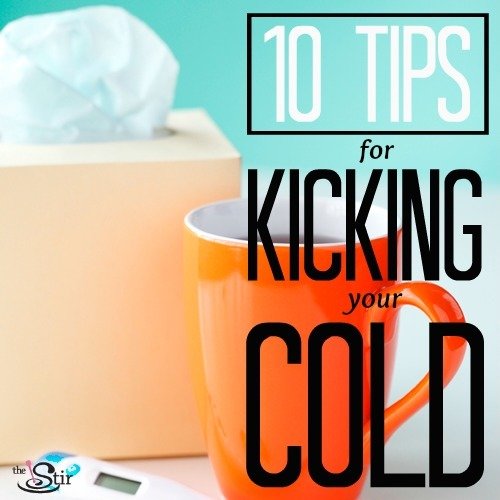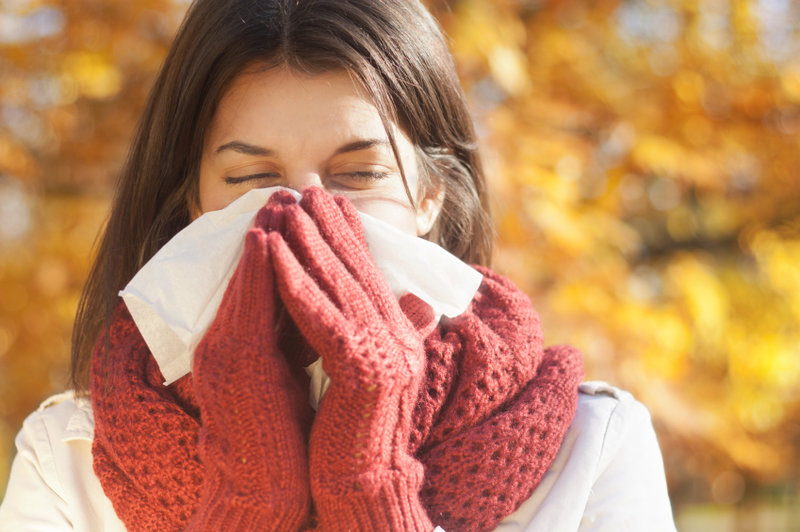Try as we might to stay healthy with vitamins, eating right, getting enough ZZZs, etc., it seems like there comes a time every year when we simply cannot avoid coming down with a nasty, stubborn cold! After the first few days of misery, you may find yourself wondering if you're EVER going to get well.
The unfortunate fact of the matter is that a cold can last up to a week and symptoms (like congestion) can persist for as many as two weeks!
That said, there are certain moves you may be making — even some you may think are helpful! — that are causing your cold to linger. We rounded up 10 of the most common mistakes that prolong a cold.

Check them out below, then tell us: What have you found helps when you have a cold that won't seem to go away?
Images © iStock.com/Thomas_EyeDesign & © iStock.com/amphotora
You Need More Rest

Even though we realize rest is imperative to effectively fighting off a cold, we may need even more downtime than we bargained for. "We are a culture of few sick days and pushing ourselves beyond what the body is capable of," explains holistic nurse educator Jennifer Schmid, RN, CNL of Oasis Wellness in Santa Clara, California.
Resting as much as you can within the first few days of a cold is ideal, but it's never too late to clean up your act by bowing out of certain commitments to take care of yourself. At the same time, you don't need to sleep for hours on end. "Rest can also mean lying on the sofa or in bed but not sleeping," says Schmid.
You're Dehydrated

As much as we hear "fluids, fluids, fluids!" when we're sick, we simply may not be getting enough to combat the loss of hydration from all that nose-blowing. (I know, ick!) For that reason, you'll do well to drink up if you can't kick that cold!
"Hydration is essential in providing your body the nutrients necessary to fight both a cold and the thinning mucus that is developing as a result of the virus," explains Joseph C. Koval, MD, medical director for Clinical Performance at Geisinger-Community Medical Center in Scranton, Pennsylvania. "Water, fruit juices, decaf tea, and even milk can be good for a cold. Despite popular belief, the protein, calories, and fat in milk can help rebuild strength. Try to avoid caffeinated drinks and sugary sodas."
You're Overdoing the Cold Medications

"Over-the-counter cold and flu products simply serve to suppress the symptoms of the cold by drying out mucus membranes," explains Schmid. "They do not actually [cure] the cold." In fact, overuse of some products, like decongestants, can remove too much moisture, making it more difficult for your body to eliminate mucus and can actually cause rebound congestion.
Plus, active ingredients like pseudoephedrine "are designed to suppress the immune system by causing a stress reaction in the body," says Schmid. "And acetaminophen can be hard on the liver and can exacerbate viral illnesses." So best to use these products in moderation and check with your doctor if you've been relying on them for more than four days.
You Actually Have Allergies

While you may be convinced that you've come down with the common cold, your symptoms may actually be stemming from allergies — and that's why they're lasting weeks!
The best way to tell the difference? "Often, colds and flus are accompanied by that classic, tickling sore throat, perhaps a low-grade fever, and aches, just before the congestion appears," explains Schmid. "Nasal phlegm is generally white to yellow, and symptoms usually resolve in about seven days. However, allergies tend to manifest with sneezing, itchy eyes, and clear nasal discharge, and they appear seasonally or after exposure to certain triggers such as cats, mold, or dairy."
You Need Better Stress Management

Just because we're sick doesn't mean everyday stressors dissipate unfortunately. But managing them is integral to recovery. "During acute or chronic stress, the release of cortisol from the adrenal glands signals to the body that there is a crisis happening and to shut down non-emergency functions, such as the immune system, so that we can run from the proverbial bear," explains Schmid. "Stress can also cause the body to release inflammatory markers that tell the white blood cells to mobilize elsewhere rather than deal with a cold. This is generally compounded by people not slowing down enough when they have a bad cold."
For that reason, stress management (meditation, deep breathing, napping, etc.) is key to finally combating a cold.
Your Diet Is Working Against You

It's perfectly common — and understandable! — to crave comfort foods when you're sick, but certain foods actually make it harder to get over your cold.
"High-sugar and refined carbohydrate foods and drinks put a strain on the body, because not only they tend to be lower in the important nutrients that fuel the immune system, such as vitamins A, D & K, and the minerals calcium and magnesium, but they require tens of enzymatic reactions — using the same vitamins and minerals mentioned above — in the body to be converted into energy," says Schmid. "A diet high in sugar and carbs also creates stress and systemic inflammation in the body."
Thus, Schmid recommends cutting back on these foods and drinks and sticking to healthier fare, like homemade soups and stews, vegetables, and combinations of whole grains like brown rice and quinoa.
You Have to Get More Quality ZZZs

Yes, it may be more challenging if you're totally stuffed up and coughing! But setting yourself up for a successful night's sleep could be the key to getting over your cold once and for all.
"Most people know to aim for eight hours of sleep each night, and it’s important to consistently get that amount and maintain a regular sleep schedule," says Dr. Koval. "Doing so can allow your body to regain the energy it needs to combat the virus."
You're Overexercising

Although moderate exercise is typically well-tolerated when you're sick, it is possible to work out too much or too hard. "Exercise in general when sick can make it harder to get well," notes Schmid. "You’re using up important nutrients to exercise instead of letting your immune system use them to create antibodies against the virus, and you likely won’t burn off any fat or build muscle either."
Instead, Schmid advises seeing an illness as a message that your body would appreciate slowing down a bit. It's also a reminder that you can "give yourself permission to heal."
You're Taking the Wrong Supplements

If you're interested in herbal remedies, there are definitely some that trump others, which may simply be a waste of time and doing nothing to squash your cold.
"Medical evidence is mixed on whether vitamins C and D shorten the duration or severity of a cold, but it is believed that maintaining adequate levels of these vitamins in general is good for your overall health, including the prevention of cold and respiratory viruses," notes Dr. Koval. "Elderberry, in its limited scientific experimentation, has shown promise in fighting the common cold and the flu, but the plant in its raw form can be toxic, so always check with a doctor before taking an elderberry supplement or extract."
More from CafeMom: 8 All-Natural Ways to Ward Off the Cold & Flu (PHOTOS)
You May Have a More Severe Health Concern

If your cold has lingered for more than a week, Dr. Koval advises seeing your doctor to check if something larger is at play or if the cold has triggered something more severe. For instance, mucus trapped in the nasal passages can lead to a sinus infection, marked by facial pain, a headache, fever, and green or yellow nasal discharge. Or a long-lasting cough of more than two weeks could be a sign of whooping cough.
“Symptoms like a fever of more than 100.5 degrees for more than two to three days, painful swallowing, or vomiting should spur a more immediate call to the doctor," he advises.




